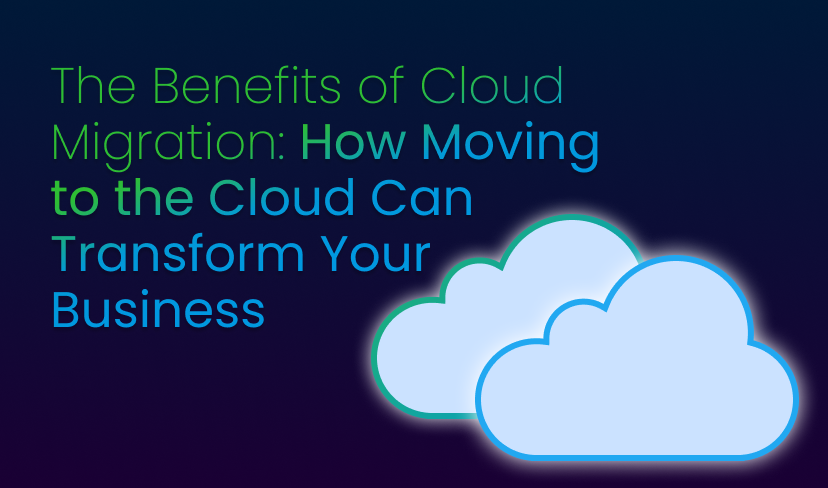Discover the power of cloud migration and its potential to revolutionise your business. In this blog, we dive into the practical benefits of migrating to the cloud, exploring how it can help you overcome challenges, boost efficiency, and drive growth.
Learn how cloud migration can streamline your operations, increase scalability, and reduce infrastructure costs. We’ll discuss the enhanced security measures offered by cloud providers, ensuring your data remains protected.
At Transputec, we understand the importance of staying ahead in a rapidly changing digital landscape. We provide insights on the strategies and tools needed for a successful cloud migration. Gain practical tips and best practices that you can apply to your own business.
Join us as we unpack the advantages of cloud migration and guide you towards a future where your business can thrive. Get ready to harness the full potential of the cloud and elevate your organisation to new heights.
Understanding Cloud Migration
Cloud migration is a strategic decision that involves transferring your business operations to the cloud environment. This process requires careful planning and execution to ensure a smooth transition. It typically involves assessing your existing infrastructure, identifying the most suitable cloud service provider, and migrating your data and applications to the cloud. Cloud migration can be categorised into three main types: Infrastructure as a Service (IaaS), Platform as a Service (PaaS), and Software as a Service (SaaS).
Enhanced Scalability and Flexibility
One of the key advantages of cloud migration is the enhanced scalability and flexibility it offers to businesses. With cloud services, businesses can easily scale their resources up or down based on their requirements. Whether you need additional storage, computing power, or software licences, the cloud provides the flexibility to quickly adapt to changing business needs. This scalability ensures that your business can efficiently handle increased workloads during peak periods without any hassle.
Cost Savings and Efficiency
Cloud migration presents significant cost-saving opportunities for businesses. By moving to the cloud, businesses eliminate the need for expensive on-premises hardware, maintenance, and infrastructure upgrades. Cloud service providers offer a pay-as-you-go model, allowing businesses to pay only for the resources they consume. This cost-efficient approach enables businesses to allocate their IT budgets more effectively and invest in other areas of growth.
Furthermore, the cloud provides increased efficiency by reducing downtime and optimising resource allocation. Cloud platforms offer high availability and automatic backups, minimising the risk of data loss and ensuring business continuity. Additionally, cloud-based applications and collaboration tools streamline workflows, enabling teams to work more productively and achieve better outcomes.
Improved Collaboration and Accessibility
Cloud migration fosters seamless collaboration and enhances accessibility for businesses. Cloud-based tools and applications enable employees to collaborate on projects in real-time, regardless of their physical location. This eliminates communication barriers and improves teamwork, allowing for efficient knowledge sharing and innovation.
Moreover, the cloud provides easy and secure access to business data and applications from any device with an internet connection. This mobility and accessibility empower employees to work remotely, increasing productivity and work-life balance. With cloud migration, your team can stay connected and access critical resources whenever and wherever they need them.
Heightened Security and Disaster Recovery
Security is a top concern for businesses when considering cloud migration. However, reputable cloud service providers offer robust security measures to safeguard your data and applications. Cloud platforms employ advanced encryption, firewalls, and multi-factor authentication to protect your sensitive information from unauthorised access.
Furthermore, cloud migration enhances disaster recovery capabilities. Cloud service providers implement redundant systems and backup mechanisms, ensuring that your data remains safe even in the event of hardware failure or natural disasters. With automated backups and data replication, businesses can quickly recover from any unforeseen disruptions and resume operations with minimal downtime.
Streamlined Business Continuity
Cloud migration plays a crucial role in ensuring seamless business continuity. By storing your data and applications in the cloud, you eliminate the risk of data loss due to local hardware failures or accidents. Cloud platforms offer geo-redundancy and data replication across multiple locations, guaranteeing the availability of your resources even in the face of unexpected events.
Additionally, cloud-based disaster recovery solutions enable businesses to create backup plans and recovery strategies. These plans outline the steps to be taken in the event of a disruption, ensuring that your business can swiftly recover and resume operations. Cloud-based backups and replication make business continuity more achievable and reliable.
Accelerated Innovation and Competitive Edge
Cloud migration empowers businesses to embrace innovation and gain a competitive edge in their respective industries. By leveraging cloud services, businesses can rapidly deploy new applications, services, and features. This agility enables organisations to adapt to market trends, customer demands, and emerging technologies more quickly.
Moreover, cloud platforms offer a wealth of cutting-edge technologies, such as artificial intelligence (AI), machine learning (ML), and big data analytics. By harnessing these capabilities, businesses can extract valuable insights from their data, improve decision-making, and deliver personalised experiences to their customers. Cloud migration facilitates innovation, allowing businesses to stay ahead of the curve and outperform their competitors.
Seamless Integration and Interoperability
For businesses with existing on-premises systems, cloud migration offers seamless integration and interoperability. Cloud service providers offer robust APIs and integration tools that facilitate the connection between on-premises infrastructure and cloud resources. This integration allows businesses to leverage the advantages of the cloud while retaining their legacy systems and applications.
Cloud migration also enables businesses to integrate different cloud services and solutions to create a unified ecosystem. This interoperability promotes data sharing, process automation, and collaboration across various departments, streamlining operations and enhancing overall efficiency.
Ensuring Regulatory Compliance
Compliance with industry regulations and data protection laws is critical for businesses in today’s data-driven landscape. Cloud service providers adhere to stringent security standards and regulatory requirements, ensuring that your data remains compliant and protected. They implement robust data privacy measures, including data encryption, access controls, and audit trails, to meet regulatory obligations.
When selecting a cloud service provider, it is essential to consider their compliance certifications and track record. Ensure that the provider complies with relevant regulations, such as GDPR, HIPAA, or PCI DSS, depending on your industry and geographic location. Cloud migration allows businesses to maintain regulatory compliance without compromising data security.
Factors to Consider Before Cloud Migration
Before embarking on cloud migration, businesses must consider several factors to ensure a successful transition. It is crucial to assess your current IT infrastructure, evaluate your specific business needs, and determine the most suitable cloud deployment model (public, private, or hybrid) for your organisation. Conduct a thorough cost-benefit analysis and create a comprehensive migration plan to minimise disruptions and maximise the benefits of cloud migration.
Best Practices for Successful Cloud Migration
To ensure a smooth and successful cloud migration, businesses should follow these best practices:
- Perform a thorough assessment of your infrastructure and applications.
- Choose a reliable and reputable cloud service provider.
- Develop a detailed migration plan, including timelines and milestones.
- Prioritise data security and compliance requirements.
- Conduct extensive testing and validation before migrating critical systems.
- Train employees on using cloud-based tools and applications.
- Implement proper monitoring and governance mechanisms post-migration.
- Continuously optimise and refine your cloud environment for maximum efficiency.
- By adhering to these best practices, businesses can minimise risks, overcome challenges, and achieve a seamless transition to the cloud.
Conclusion
Cloud migration offers a plethora of benefits that can transform your business and drive sustainable growth. Enhanced scalability, cost savings, improved collaboration, heightened security, streamlined business moving to the cloud. By considering the factors discussed in this blog and following best practices, businesses can successfully migrate to the cloud and unlock its full potential.
To get started with Transputec and experience the benefits of cloud migration firsthand, contact us today. Our team of experts will guide you through the process, ensuring a seamless transition and empowering your business for future success.







